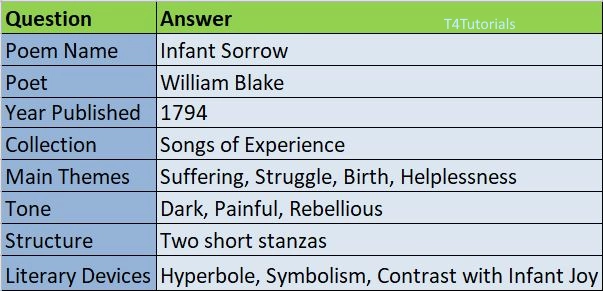Summary:
Infant Sorrow is a contrasting companion poem to Infant Joy, appearing in Songs of Experience (1794). Instead of celebrating birth as a moment of happiness, this poem depicts birth as a struggle, filled with sorrow and pain.- The speaker is a newborn child who feels trapped and miserable upon entering the world.
- The mother groans in pain during childbirth, while the father weeps, indicating that the birth is not a moment of joy but one of suffering.
- The baby is helpless yet rebellious, struggling against the world, leaping, crying, and writhing in discomfort.
- The final image of the baby sulking on the mother’s breast suggests a sense of defeat and quiet suffering.
- This poem reflects Blake’s “Experience” perspective, where the world is harsh, restrictive, and full of suffering from the very moment of birth.

10
Score: 0
Attempted: 0/10
Subscribe
| Question | Answer |
| Poem Name | Infant Sorrow |
| Poet | William Blake |
| Year Published | 1794 |
| Collection | Songs of Experience |
| Main Themes | Suffering, Struggle, Birth, Helplessness |
| Tone | Dark, Painful, Rebellious |
| Structure | Two short stanzas |
| Literary Devices | Hyperbole, Symbolism, Contrast with Infant Joy |